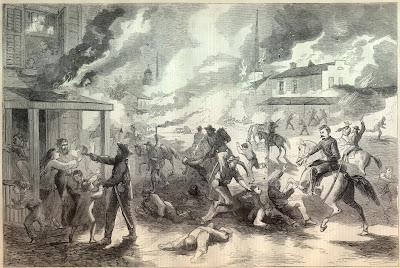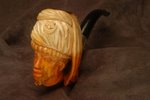Revisiting Quantrill's Guerilla War on Kansas Today

The New Powers In College Football Carry Old Baggage
As Showdown Looms,
Kansas and Missouri Fans
Re-Fight the Civil War
By ADAM THOMPSON
November 20, 2007; Page A1
KANSAS CITY, Mo. -- As the universities of Kansas and Missouri prepare to play the most important football game in their 116-year-old rivalry, trash talking is rampant here in a metropolis that straddles both states.
Yet this isn't just the usual back-and-forth about which quarterback or defense is superior. Nor is it centered on the inevitable jokes about how many Kansas (or Missouri) students are needed to change a light bulb. Rather, this trash talking is focused on which state's residents behaved more abominably amid the Civil War.
Fans go back to the history books and start calling people names for things that started 150 years ago," says Kevin Worley, a Kansas City-based documentary filmmaker who isn't immune to that tendency himself. A die-hard Missouri fan, Mr. Worley suspects that "there's this ancestral hatred of Kansas bred in me" by a lineage traceable to soldiers who marched with Confederate general Jo Shelby.
[Kansas v. Missouri]
To most of the nation, the showdown Saturday between second-ranked Kansas and fourth-ranked Missouri will most likely determine which team will play in the national championship game. (To reach that final, the victor Saturday would need to win one subsequent game.)
But to many here on both sides of the state line, the game is merely a proxy for a war that never really ended. Perhaps no other football rivalry in the nation pits against each other states that once fought as brutally as did Kansas and Missouri. Evidence that the feud is ongoing can be seen on the back of Dave Hickerson, a Missouri fan who this weekend chomped a cigar in a Kansas City bar called the Velvet Dog.
He sported a University of Missouri football jersey that bore the name not of Chase Daniel, the team's spectacular quarterback. Rather it said Quantrill. A Missouri hero and Kansas villain, William Quantrill led a Rebel guerrilla unit that in 1863 burned and pillaged Lawrence, home of the University of Kansas, in the process slaughtering about 150 people, including children.
"I don't think there's anything redeeming to be said about [the jersey] except that it" angers Kansans, says Mr. Hickerson.
But Kansans have their own T-shirt that they hope will offend Missourians. The shirt says: "Kansas: Keeping America safe from Missouri since 1854." The shirt features a drawing of abolitionist John Brown, who before his famous raid on Harpers Ferry led murderous raids against farms and families in pro-slavery Missouri. "They're the slave state. We're the Free State. Look who won out in the end," says Heather Knox, a 25-year-old accountant and Kansas alumna who lives in Kansas City, Mo.
On the gridiron, theirs is the oldest major college rivalry west of the Mississippi River. Neither team is usually a contender for the national title; their showdown more often determines third- and fourth-place in the six-team North division of the Big 12 conference. But bitterness on the football field goes back a long ways. The two sides can't even agree on their series' all-time record. Missourians say the series is tied 53-53-9, while Kansans say they own a two-game lead. The point of contention is their 1960 meeting, which the Jayhawks won with ineligible players. That loss killed Missouri's best chance at a national title, and the Tigers have never again reached No. 1 in the polls.
The game Saturday will take place in a neutral site in the city -- Arrowhead Stadium, home of the Kansas City Chiefs professional franchise -- but nothing about it is expected to be neutral. A night-time kickoff means that fans will have plenty of time to drink beforehand. Arrowhead officials, who typically replace about 15 of the stadium's 80,000 seats following a Chiefs game, expect the Kansas-Missouri brawl to leave as many as 500 seats destroyed. Tickets with double-digit face values are selling for $300 online.
Neither school has ever won a national football championship. Indeed, neither team has finished atop their conference since 1969. To fans on both sides, it is maddening to think that the biggest obstacle toward doing so this year is their oldest nemesis. "I hate Kansas more than everything," says Mr. Hickerson. On weeks when they're not playing each other, "I hate Kansas so much, I would rather have Kansas lose than have Missouri win." This hatred dates back to the 1850s, when the Great Plains state of Kansas became a beachhead for men around the country committed to ending slavery. Many, however, hid behind that noble cause, all the while killing, pillaging and raping their way across the culturally Southern state to the east, Missouri. These Kansas guerrillas called themselves Jayhawkers -- supposedly a combination of two birds, the jay and the hawk.
This hatred dates back to the 1850s, when the Great Plains state of Kansas became a beachhead for men around the country committed to ending slavery. Many, however, hid behind that noble cause, all the while killing, pillaging and raping their way across the culturally Southern state to the east, Missouri. These Kansas guerrillas called themselves Jayhawkers -- supposedly a combination of two birds, the jay and the hawk.
Today, it is a sore point among Missouri fans that the University of Kansas mascot is the Jayhawk. Matt Gaunt, a development officer for Missouri's agriculture college, concedes that his state's fighters committed atrocities as well, but notes that Missouri never named a team after them. Some argue that Missouri's mascot -- the Tigers -- are named after some pro-Union forces in an otherwise Confederate state.
But the hometown of the Missouri Tigers, Columbia, is still known as "Little Dixie," and many in Missouri remain proud of their Confederate past. It's enough to start former Missouri player Brandon Barnes, who is African-American, wondering whether Tiger fans are "hating the Jayhawkers for something I might celebrate." But then he remembers the time that Jayhawk fans threw ice at him and footballs at the Missouri team bus. "We hate each other for a reason," he said, as he sat in a Kansas City bar on Saturday.
On chat boards, fans of both teams are weighing in. "Definition of Jayhawk = murderer, rapist, low-life scum. Kansas fans are so stupid they think that name is something to be proud of!," said a post on a Kansas City Star message board.
A University of Kansas poster wrote on a fan board: "The Jayhawkers defended Kansas against terrorists and helped make Kansas a free state just before the start of the Civil War."
Here in a city where the line between the two states is virtually invisible, many Missouri fans won't live in Kansas, and vice versa. When Jayme Salinardi, a lawyer, proposed moving to a Kansas suburb that offered first-class public schools, his wife, Missouri-born Heather, refused. "I'm not living on the Kansas side," he recalls her saying. He finally prevailed -- by finding a house that is only one block from Missouri.
Missouri fans won't live in Kansas, and vice versa. When Jayme Salinardi, a lawyer, proposed moving to a Kansas suburb that offered first-class public schools, his wife, Missouri-born Heather, refused. "I'm not living on the Kansas side," he recalls her saying. He finally prevailed -- by finding a house that is only one block from Missouri.
The game this Saturday will provide the perfect capper to a college football season where up has been down. Traditional powers like Notre Dame have stumbled badly while upstarts like South Florida have joined the Tigers and Jayhawks in making once-unthinkable runs for the top. Neither Kansas nor Missouri was expected to win the six-team Big 12 North division. That crown was supposed to belong to the Nebraska Cornhuskers, a team that is 5-6 and that lost to Missouri and Kansas by a combined score of 117-45.
Not everyone sees the upcoming game as bearing great historical overtones. Corby Jones, a star quarterback for the Tigers in the mid-1990s, sat in a sports bar Saturday watching with glee as Missouri beat Kansas State, setting the stage for this week's mammoth showdown with Kansas, an 11-0 team that before the season started was expected to finish fourth in the Big 12 North division.
But even if Missouri, 10-1, loses, Mr. Jones, a lawyer, won't be leading any campaigns against Kansas or its fans. "It's a football game," he said. "It's not war."




No comments:
Post a Comment